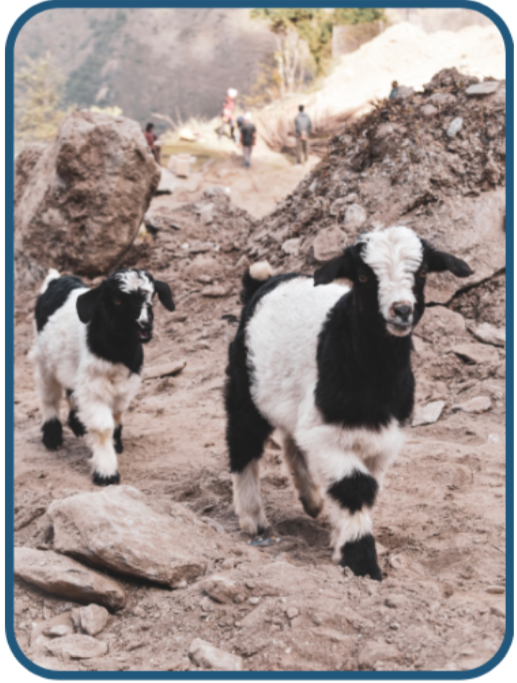
In this current era, we face many challenges. One of our main problems is to reconcile the demands of the economy, the pursuit of happiness and respect for the environment. These imperatives correspond to three time scales – short, medium and long term – on which three types of interests are superimposed: our own, the interests of those close to us and those of all sentient beings.
Matthieu Ricard, Altruism
Karuna-Shechen proposes to put altruism at the heart of our lives
Karuna acts and advocates for a more altruistic world. Therefore, the organization strives to take care of all beings – humans as well as animals – and of nature. In the weeks to come, we will reflect on and act against animal suffering, extreme poverty and the climate crisis.
Understanding our relationship with the animal world in an altruistic way

In France, more than 3.2 million land and sea animals are killed every day in slaughterhouses, according to the organization L214. In 2021, thanks to the work of civil society on legislation in favor of animal rights, significant progress has been made, such as the end of the commercial exploitation of wild species and the appointment of “animal welfare” representatives in farms. This shows that our commitment is essential to ensure that unnecessary animal suffering is avoided as much as possible.
Because there is still a lot to do to move towards more consideration for the other species that share the earth, Karuna-Shechen is committed to the animals in its veterinary health program in the heart of the Himalayas. Indeed, in the Ruby Valley of Nepal, the inhabitants have developed a sensitive and reciprocal bond with the animals that share their land. Karuna works with them: 13,000 animals were treated and dewormed in 2021.
Inequalities that fragment the world

According to the latest Oxfam report, hunger kills at least 2.1 million people every year in the world. In France in 2020, 7 million people needed food aid to live, that is 10% of the French population. Growing inequalities that accentuate poverty and result in lack of resources, but also in famine, malnutrition, limited access to education and basic services. It is therefore essential to urgently and pragmatically rethink our lifestyles and economies in order to make equality our priority, to act individually and collectively with courage and to listen to movements calling for change.
In India and Nepal, Karuna is committed to breaking the cycle of extreme poverty and enabling women, men and children to have better access to education, health, nutrition and economic opportunities. Our overall development strategy is based on active community participation to ensure community empowerment. In 2021, we had to act with urgency, providing life-saving assistance to people.
The climate crisis: a major problem facing all of hymanity

The effects of the climate crisis are already present, widespread and often irreversible. Their consequences are measurable on humans and ecosystems. Indeed, more than 3.3 billion people live in contexts that are highly vulnerable to climate change, i.e. half of the world’s population, according to the second part of the 6th IPCC report. For these people, climate change is not hypothetical, but a daily reality. This report is certainly pessimistic, but it still urges us to act, because every tenth of a degree counts to prevent the situation from getting worse.
Karuna-Shechen is committed to the climate emergency. In India as in Nepal, the consequences of climate change are real: the challenges related to water shortages or floods are omnipresent. To face these challenges, Karuna supports rural villages in the implementation of collective projects to improve the life of entire villages. This approach allows us to strengthen the resilience of the populations and to work hand in hand in the implementation of solutions adapted to their daily lives.
As Matthieu Ricard suggests, “without wisdom, compassion is blind, without action compassion is sterile.” Everyone can take action against animal suffering, extreme poverty, and the climate crisis. Whether it’s with a neighbor, a family member, or strangers, we must commit to build a more just world for ourselves, for others, for the planet.
Together, let’s put altruism at the heart of the debate! You can also act with us and support our solidarity actions.
Ressources to go further
- Understanding poverty – World Bank
- Report – Inequality kills – Oxfam English (2022)
- Latest IPPC report – Summary for Policy makers
